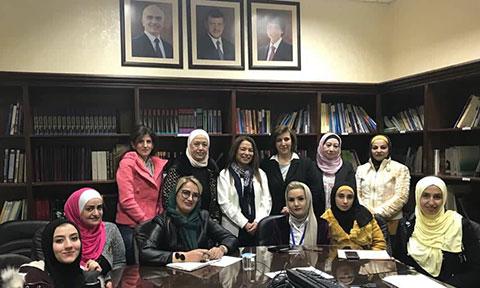

HPC Secretary General, Dr. Abla Amawi emphasized that women highly contribute to realizing and investing of policies for demographic dividend through education and providing them with the skills required for the labor market in order to increase their participation in the economy, thus increase their productivity as a requirement to achieve the demographic dividend.
On Monday, during her lecture before the Masters students of the Center for Women's Studies at the University of Jordan on “Women’s role in realizing and investing in the demographic dividend" said that the statistics indicate the low participation of Jordanian woman in the labor market compared to males; despite their high level of education.
She pointed out that the most important policies for women’s empowerment in society and related to realizing the strategic objectives of the demographic dividend are, to inforce the minimum age for females’ marriage considering the high rate of girls getting married under the age of 18 years, activate women's employment policies set forth in the National Employment Strategy. Moreover, to provide support services for women worker such as nurseries and transportation, activating the implementation of flexible work, supporting women’s orientation towards vocational training and technical education and enhancing their role in the rural development process in the governorates.
Furthermore, Amawi highlighted the importance of unifying the national efforts to implement the outputs of the national plans, strategies and policies regarding women, such as Jordan Economic Growth Plan 2018 - 2022, Jordan Vision 2025 and the National Strategy for Women, in order to improve the opportunities for women’s empowerment in society in line with the objectives of sustainable development and achieving the demographic dividend.
Amawi stated that there are challenges facing women in various fields, including economy, which include weak compatibility between education outputs and labor market requirements, high female unemployment rates, specifically educated females, and wages inequality between males and females.
She added that there are also social and cultural challenges facing women in the society, notably the weak integration between the social role of women and men, which represent an additional restriction on their social responsibilities, restrictions on women’s contribution to public life, their limited role in decision-making in addition to the high rates of (child) underage -marriage cases.
During the lecture, Amawi also reviewed the demographic characteristics of Jordan, the concept of demographic dividend and its policies, and the main problems that demographic dividend is facing in the unregulated labor sector and the implications thereto.
For her part, Director of the Center for Women's Studies, Dr. Abeer Dababneh emphasized the importance of acquaintance for students of the Center on the practical expertise and experience of Jordanian academic figures that have a long history in the field of women, development and population, to enhance their theoretical study and provide them with further experience.
The faculty member at the Center, Dr. Amal Kharouf said that the lecture comes in the course of "Gender and Sustainable Development" subject, which is being taught at the Center and tackles a number of topics within the women and population field and its relation to development. This will enable students to connect theory with practical application and gain more knowledge about the role of women in the society, in addition to the importance of women’s participation in achieving comprehensive development in all fields.
At the end of the lecture, there was a discussion on the subject where Amawi answered the students’ inquires.







